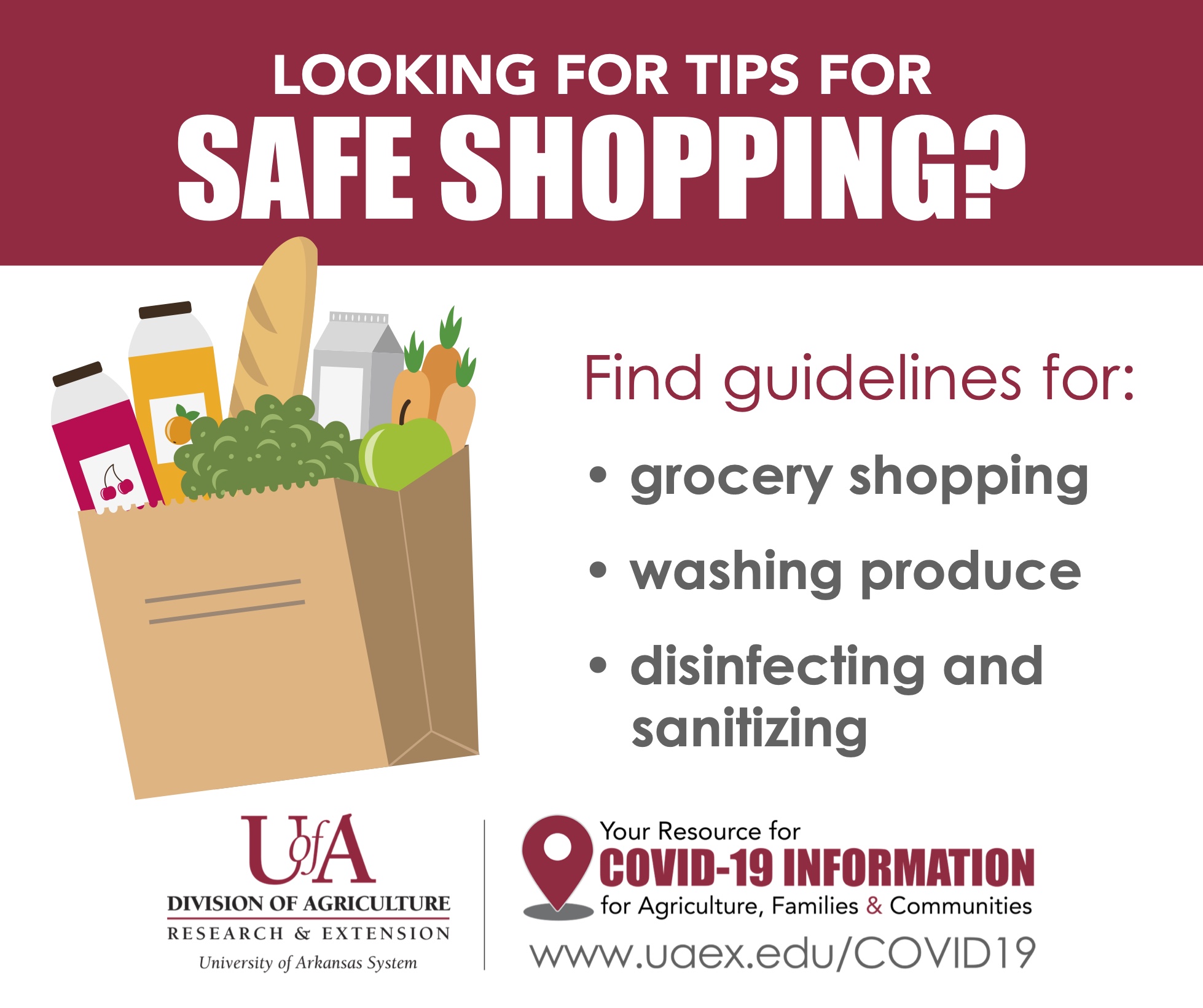April 20, 2020
Planning, preparation and precaution keys to safe grocery shopping
By Tracy Courage
U of A System Division of Agriculture
Fast facts
- Follow good hygiene, food safety guidelines to reduce spread of COVID-19
- CDC recommends wearing face coverings to grocery store
- Wash produce with cold tap water to clean
(651 words)
(Download this story in MS Word format here.)
LITTLE ROCK — Getting groceries has become significantly more complicated in the time of COVID-19. Lines can be long and supplies short, and consumers worry about getting sick.
The good news is that there is no evidence of food or food packaging being associated with the transmission of COVID-19, according to the U.S. Food and Drug Administration.
The virus can, however, live on surfaces for varying amounts of time: up to three hours in aerosols, four hours on surfaces like copper, 24 hours on cardboard and for as long as two to three days on plastic and stainless steel, according to the U.S. Centers for Disease Control and Prevention.
The CDC now recommends adults wear a cloth face covering in public spaces, such as grocery stores and pharmacies. While going to the grocery store may be unavoidable, the best way to curtail risk is to limit store visits and public interactions.
“If you’re used to shopping once a week, try to shop once every two weeks, if you can afford to do that financially and if you have space to store extra items,” said Katie Frizzell, Ashley County extension agent for the University of Arkansas System Division of Agriculture Cooperative Extension Service.
Many stores offer online ordering with curbside pickup. Home delivery services, via apps such as Instacart, also offer the convenience of home delivery — but at a price. Many grocers offer designated shopping hours for people most vulnerable to COVID-19, including those age 65 and older, pregnant women and people with underlying health issues that may compromise their immune systems.
Frizzell also recommends shopping at small, family-owned groceries, which typically see fewer customers and offer good customer service.
Frizzell offers these grocery shopping tips:
- Plan meals in advance so you know what food to buy
- Take inventory of your pantry so you don’t overbuy
- Buy in bulk if you can
- Stick to a list
- Organize shopping list around the store’s layout to minimize time in the store
- Avoid store peak hours
- Order online or order ahead if you can
- If you are over 65, pregnant, or have health risks, ask about special store hours
- Expect longer lines and allow adequate time
- Limit the number of family members who shop
At the store:
- Wear a mask
- Avoid touching your eyes, mouth and nose
- Maintain social distancing of at least 6 feet between you and other customers and store employees
- Minimize distractions
- If the store is out of something, improvise or do without. Don’t ask employees to go check the stock. Most stores are restocking as quickly as they can
- Don’t “panic buy”
- If you wear plastic gloves, dispose of them after you leave the store but before you get into your car
- Use hand sanitizer before getting into your car
When you get home:
- Leave your shoes outside
- Wash produce under cold running tap water to remove dirt and bacteria before eating or preparing
- Do not wash fruits and vegetables with detergent or soap. These products are not approved or labeled by the FDA for use on foods
- Wipe down reusable bags
- If you think a food container surface may be infected, clean it with simple disinfectant
- Take off clothes worn to store and put on clean clothes
- Put mask in washing machine. Use the “sanitize” setting on your washer or dryer, if available
- Wash your hands with soap and water
- Wipe down doorknobs, faucets and light switches you’ve touched
For questions and answers about food safety and COVID-19, visit https://www.uaex.uada.edu/life-skills-wellness/health/covid19/mythbusting.aspx. To learn about extension programs in Arkansas, contact your local Cooperative Extension Service agent or visit www.uaex.uada.edu. Follow us on Twitter at @AR_Extension.
About the Division of Agriculture
The University of Arkansas System Division of Agriculture’s mission is to strengthen agriculture, communities, and families by connecting trusted research to the adoption of best practices. Through the Agricultural Experiment Station and the Cooperative Extension Service, the Division of Agriculture conducts research and extension work within the nation’s historic land grant education system.
The Division of Agriculture is one of 20 entities within the University of Arkansas System. It has offices in all 75 counties in Arkansas and faculty on five system campuses.
Pursuant to 7 CFR § 15.3, the University of Arkansas System Division of Agriculture offers all its Extension and Research programs and services (including employment) without regard to race, color, sex, national origin, religion, age, disability, marital or veteran status, genetic information, sexual preference, pregnancy or any other legally protected status, and is an equal opportunity institution.
# # #
Media contact:
Tracy Courage
Director, Communications Services
U of A System Division of Agriculture
Cooperative Extension Service
(501) 671-2126
tcourage@uada.edu
